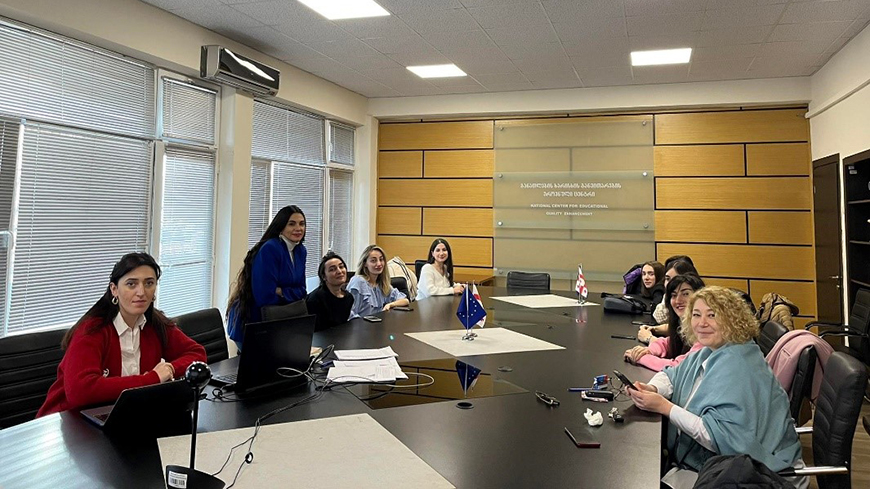The ENIC and NARIC networks and the impementation of the implementation of the Lisbon Convention

The European Network of National Information Centres on Academic Mobility and Recognition (ENIC Network) was set up by the Council of Europe and UNESCO. It works in close collaboration with the European Union's Network of National Academic Recognition Information Centres (NARIC Network). The ENIC Network brings together the national centers responsible for the recognition of academic qualifications at national level.
Council of Europe Education Department supports ENIC Centres in the implementation of the Lisbon Recognition Convention through a grants scheme
The Council of Europe together with UNESCO ensures the Secretariat of the Convention on the Recognition of Qualifications concerning Higher Education, known as the Lisbon Recognition Convention, and the European Network of Information Centres in the European Region (ENIC).
To follow up on the recommendations of 2nd monitoring report of the implementation of the Lisbon Recognition Convention(adopted in November 2022), the Council of Europe launches a grants scheme for the ENIC Centres.
The objective of the Grants scheme is to support the ENIC Centres in stepping up the implementation of the Lisbon Recognition Convention in their respective countries, with a focus on the following topics:
- Recognition of refugees’ qualifications,
- Combating education fraud,
- Improving information provision,
- Supporting university networks on recognition.
As a result of the call for proposals, the six projects have been selected for funding:
Albania
Beneficiary: Center of Educational Services
Renforcer les capacités des évaluateurs de diplômes (ECRE)
Enhancing the Capabilities of the Credential Evaluators (ECRE)
The project seeks to support the following measures:
- The Center of Educational Services will be supported to promote cooperation and mobility in the field of education,
- The National Center will have the right and needed skills and expertise to ensure the recognition of higher education qualifications in fair, transparent and non- discriminatory matter,
- The increase in the skills and expertise of the credential evaluators at the centre,
- The increase in the skills and expertise of the credential evaluators at the centre, related to the recognition of diplomas for refugees,
- A new updated website will offer the needed and right information to all individuals and organisations,
- A new updated website will be enriched with translated documents related to the academic recognition of qualifications.
This project will have an important impact to all the target groups, that is, all the individuals and organisations involved in the recognition of qualifications earned abroad.
Armenia
Beneficiary: National Information Centre on Academic Recognition and Mobility of Armenia (ArmENIC)
Equipping education stakeholders with competences to detect and combat education fraud/DETECT
In 2021 a team of experts from the National Information Centre on Academic Recognition and Mobility of Armenia (ArmENIC) and a Council of Europe expert, with the financial support of the Council of Europe, conducted the study on “Developments and Detection of Education Fraud: Risks and Responses in the COVID-19 Age”. The study was initiated to reveal the need caused by the COVID-19 pandemic to reconsider the traditional tools and policies used for transparency, accountability, and anti-corruption measures in education.
The results of the study revealed that education fraud and corruption practices not only hinder access to all levels of education, but also affect the quality of education, the credibility of research results and challenge the recognition of qualifications. Based on the outcomes of the study, the existing policies and procedures need to be reviewed and adapted considering the way digital technologies have impacted the proliferation of education fraud.
Thus, the project “Equipping education stakeholders with competences to detect and combat education fraud/DETECT” aims to equip stakeholders in education with the competences necessary to prevent, detect, and combat education fraud through developing and conducting a training module based on the outcomes and recommendations of the study. The training will provide a comprehensive understanding of the problem of education fraud and techniques needed to prevent, detect, and combat it. It will also contribute to raising awareness, prevention, early detection, legal and ethical considerations. Overall, the training will be an asset for the stakeholders in education to protect their resources, reputation, and credibility. By providing participants with the knowledge, skills, and tools necessary to detect and prevent fraud, the training will reduce the impact of fraud and promote a culture of integrity and accountability.
Bosnia and herzegovina
Beneficiary: Centre for Information and Recognition of Qualifications in Higher Education (CIP)
Implementation of the Lisbon Convention in Bosnia and Herzegovina – ILIRIC
The project is aimed at the implementation of the Lisbon Recognition Convention (LRC) in Bosnia and Herzegovina and will last until November 2023. The project aims to analyse all regulations regarding recognition of foreign higher education qualifications in Bosnia and Herzegovina, to facilitate the process of implementation of LRC, and to present to the competent authorities a proposal for model regulations, trainings, and workshops.
To achieve a greater degree of harmonisation of legislation with the Lisbon Convention, CIP wants to encourage competent educational authorities and other stakeholders to harmonise regulations of foreign higher education qualifications with the provisions of the Lisbon Convention and its accompanying documents.
It is planned to create a model rulebook on the recognition of foreign higher education qualifications and to promote it and send it to the competent educational authorities for adoption. Also, the project aims to ensure the translation of accompanying documents of the LRC into the languages that are in official use in Bosnia and Herzegovina, to enable the stakeholders to understand the procedure for the recognition of foreign higher education qualifications and their application.
The purpose of the set goals is to standardise the procedures for the recognition of foreign higher education qualifications in BiH so that the recognition is fair and easier for everyone who wants to exercise the right to recognition in BiH.
Georgia
Beneficiary: The National Center for Educational Quality Enhancement
Promoting Implementation Procedures in Practice for the Recognition of Education Received by Refugees
The overall objective of the project is to improve the legal framework regarding the recognition of education received by refugees and increase awareness of this topic in Georgia. The project seeks to develop more flexible and effective approaches to the recognition of education received by refugees. Furthermore, the project will prepare stakeholders and raise their awareness in order to enable refugees to receive education, find a job, socialise, and realise their potential in a foreign environment. The mentioned issue will significantly improve the Georgian educational system and bring it into compatibility with international obligations.
Within the framework of project implementation, the NCEQE will conduct research on the best international practices on the issues of recognising the education of refugees, evaluate the readiness of higher educational institutions (HEIs) in Georgia in terms of conducting the procedures, create a guide and conduct training for HEIs and stakeholders, and print brochures for potential applicants.
Among the themes that are to be addressed at this stage of the project are the following:
- what criteria should be used to select the countries for the best practice research,
- what issues should the research team focus on when developing the methodology and questionnaires,
- in what sense would it be appropriate to involve a legal specialist, and at what stage,
- how to conduct research methodology, questionnaires in universities, how to prepare training module and provide training for HEIs,
- advantages of joining the European Qualifications Passport for Refugees -EQPR for Georgia.


Ukraine
Beneficiary: State owned company Information and Image Center
UaReNext – Next steps in the Ukrainian recognition network
On March 2, 2020, the Ukrainian recognition network UaReNet was founded under the ENIC Ukraine initiative. The network aims to improve and develop the procedure for foreign educational qualifications recognition in Ukraine. Currently, 94 higher education institutions have joined the UaReNet network. The network needs further development and filling with content, new forms of interaction and information support.
The next steps are suggested for network development:
- Creation and filling a separate page of the UaReNet network on www.enic.in.ua website,
- Conducting seminars (online format) dedicated to foreign qualifications recognition,
- HEIs information support (digests publishing),
- Extension of country profiles on www.enic.in.ua,
- Updating and creating informational materials about the education system of Ukraine,
- Internal trainings for ENIC Ukraine employees.

United Kingdom
Beneficiary: Ecctis Limited
Tracking Refugee Applications for Study and Employment in the UK (TRASE UK)
The Tracking Refugee Applications for Study and Employment in the UK project (TRASE UK) will involve surveys of refugee applicants, as well as UK ENIC members and other organisations such as professional bodies and employers, to seek to understand:
- how useful the information provided in the Statements of Comparability have been for refugees,
- whether further guidance could be provided to support refugee applicants, and
- what use has been made recently of the European Qualifications Passport for Refugees (EQPR) in the UK.
The project supports the functioning of Article 7 of the Lisbon Recognition Convention on the recognition of qualifications held by refugees, displaced persons, and persons in refugee-like situations.
Through the surveys, and a roundtable with UK organisations and UK ENIC members, the project team will develop a report outlining aspects of the UK ENIC Statements which are most beneficial for refugees (to inform the rest of the ENIC network) and areas where information and guidance could be improved (for example, potentially in relation to incomplete qualifications or applications with missing documents). The report will be shared with the ENIC network to promote best practices in credential evaluation for refugee applicants.



